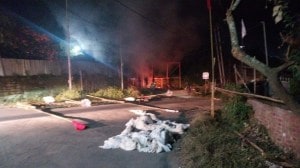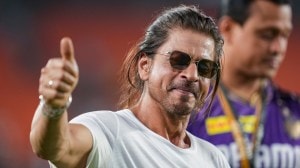Vajpayee carries the night, Sonia too has her day
At the stroke of the midnight hour, the no-confidence motion in Lok Sabha was put to vote and decisively defeated—marking not the end b...

At the stroke of the midnight hour, the no-confidence motion in Lok Sabha was put to vote and decisively defeated—marking not the end but the beginning of a no-holds barred battle between a confident ruling coalition and a combative Sonia Gandhi-led Opposition, a foretaste of which was evident in the uncommonly bitter 20-hour-long debate lasting two days.
Although the Congress lost the numbers game (312-186), it managed to consolidate its position as the leading force in the opposition with its leader Sonia Gandhi appearing to gain in confidence.
|
A B VAJPAYEE |
SONIA GANDHI |
|
• About the motion: I was reading the charges by the Opposition in the motion… they are grave. It is as if some has picked up a dictionary and taken out the words: ‘‘irresponible, insensitive, incomptetent…’’ |
• About The Motion: All I can say is that it’s the Opposition’s motion, hence can be worded only as per Opposition’s liking. |
What was also clear was that for the BJP, more than anything else, it was Prime Minister A B Vajpayee who was its trump card, who was the man behind whom all NDA allies stood solidly as they eloquently praised his leadership and attacked the ‘‘leaderless’’ opposition.
And Vajpayee, who replied to the marathon discussion around 11 pm, was well aware of it. So he did not attempt to rebut the charges made by Sonia Gandhi in her nine-point statement against the government. Instead, he took the characteristic grand high ground, expressing great umbrage at the tone and tenor of the Opposition’s attack.
His refrain: there has been a steep fall in the standards of the political discourse of the country and the Congress needs to temper itself with ‘‘decency’’ and maturity.
He took particular offence at the opposition’s charge that the government had mortgaged India’s independent foreign policy, and asserted that when it came to foreign policy, there had always been a tradition of consensus in India.
Denying the charge of bowing to external pressures, he said India was too great a country to ever do so. ‘‘Is India so low in esteem that it can be pawned?’’ he asked.
Vajpayee also used the occasion to come out in full defence of the defence minister George Fernandes and said though he had been ostracised by the opposition, he ‘‘remained committed to his duty.’’
Praising Fernandes for raising the morale of the armed forces through his frequent visits to remote border areas, the prime minister said there was nothing in the Tehelka case against him.
In response to Somnath Chatterjee’s query as to why Fernandes was brought back into the ministry after he had resigned over Tehelka, Vajpayee snapped, ‘‘I brought him back. It is the prime minister’s prerogative.’’
Barring foreign policy and Fernandes’s reinduction, Vajpayee did not get into the nitty gritty of the charges levelled by Sonia Gandhi, and preferred to focus on the big picture. India was a great nation with exemplary democratic traditions, and it did not behove the nation’s oldest party to resort to pettiness, Vajpayee said.
In the process, he sought to re-establish himself as the leader not just of the NDA government but of the nation as a whole—emphasising that differences over policy were inevitable but they should not descend to abuse.
In her concluding speech, Sonia appeared unfazed by the often vitrolic attacks made against her in course of the debate and maintained that her chargesheet was based on information from government documents.
In a fiesty rejoinder to the steady stream of comments from the treasury benches about her origins and accent, she said: ‘‘When I talk of the nation, they comment on my language and style; when I talk of the poverty and plight of the people, they level personal allegations against me.’’
On the whole, the debate was marked by even greater acriomony on the second day than the first. If Prabunath Singh (Samata) raised the hackles of Congress MPs by questioning Sonia Gandhi’s citizenship, Raghuvansh Prasad Singh (RJD) riled BJP members equally by referring to how RSS-BJP members sought mercy during the Emergency.
Photos




- 01
- 02
- 03
- 04
- 05



























